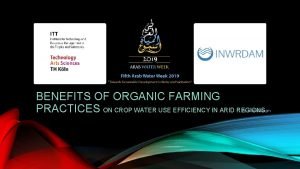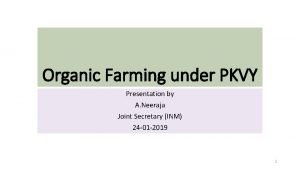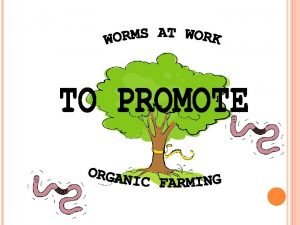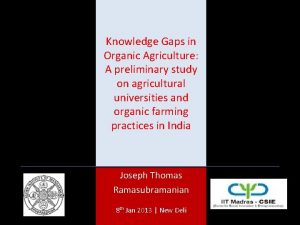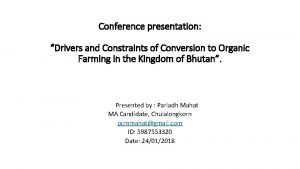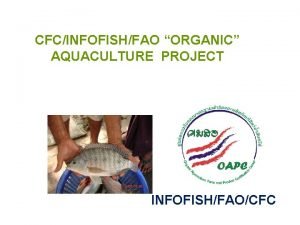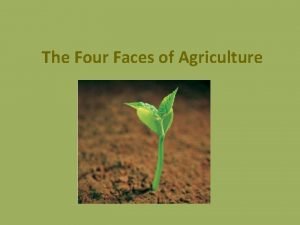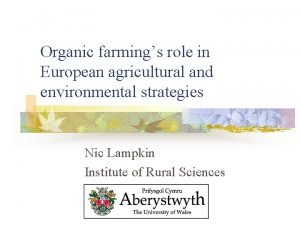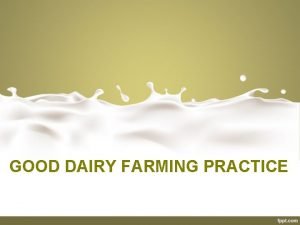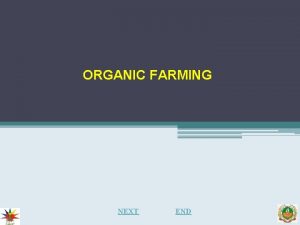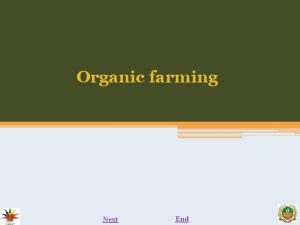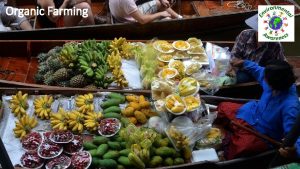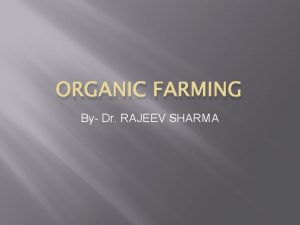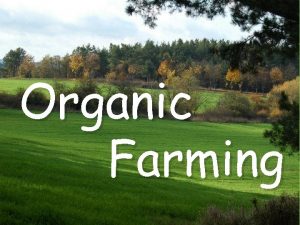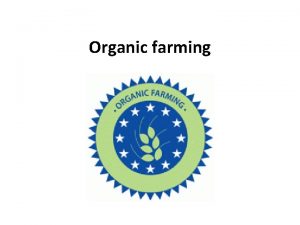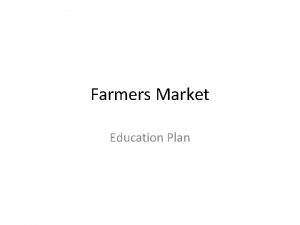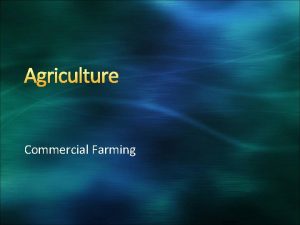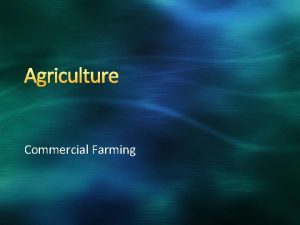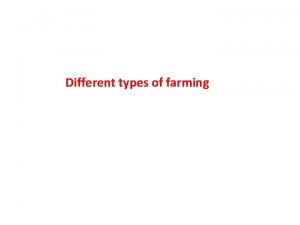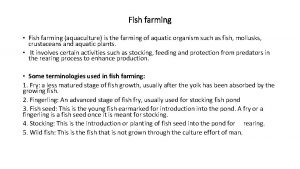Grain Farmers Perceptions of Organic Farming Practices Kelsey
















- Slides: 16

Grain Farmers’ Perceptions of Organic Farming Practices Kelsey Hall Department of Agricultural Communication, Education and Leadership M. S. in Agricultural and Extension Education

Introduction § Determine Ohio grain farmers’ attitudes toward organic farming and perceived social norms influencing their attitudes. • Consider whether interpersonal communication and media sources influence grain farmers’ attitudes toward organic practices. • Knowing communication sources used to form attitudes toward organics would help agricultural communicators know venues for targeting specific audiences with information.

Background • Past research compared organic and non-organic farmers on attitudes toward organic farming and intentions for adopting organic practices. • These studies neither surveyed farmers in specific commodities nor considered communication influencers. § Unveiling barriers against organic adoption could help researchers overcome problems before introducing other new farming practices. • Food processors and livestock feed producers would benefit from knowing potential growers of organic grains.

Theory of Planned Behavior (TPB) Hrubes & Ajzen, 2001

Self-efficacy • PBC relates to individual’s control to perform a behavior • Ajzen thought self-efficacy measures individuals’ perceptions of how easy or difficult performing a behavior is likely to be and how much confidence they have in their ability to perform that behavior. • Self-efficacy influences individuals’ attitudes and can motivate choices regarding behavior.

Attitude • Component of TPB. • Cognitive, affective, and behavioral categories disclose individuals’ attitudes (Eagly & Chaiken, 1993). • Behavioral category involves individuals’ actions regarding their attitude. • Concept of attitude in behavioral category relates to TRA and TPB.

Communication Influence • Mass media and interpersonal communication influences studied frequently in health communications • Communication research shows media effects influence thoughts, behavior, or attitudes and emotions on different levels depending on media’s power (Bryant & Thompson, 2002). • One can predict an attitudinal change or creation based on the amount of information presented and how information is reported in television and print (Bryant & Zillmann, 2002; Zeller, 1991).

Communication Influence • Interpersonal communication is significant factor in specific media affects (Bryant & Thompson, 2002). • Media affects opinion leaders who are accountable for changing the public’s opinions (Bryant & Zillmann, 2002). • Individuals influenced by affiliation with social groups, organizations, and religion (Heath & Bryant, 2000).

Research Questions 1. Does perceived behavioral control have an effect on Ohio grain farmers’ conversion to organic farming practices? 2. What are Ohio grain farmers’ attitudes toward adopting organic growing methods in their grain operations? 3. What are the subjective norms that influence Ohio grain farmers to adopt organic farming practices? 4. Do demographic characteristics influence Ohio grain farmers’ attitudes toward adopting organic farming practices?

Methodology • Descriptive survey • Combined membership lists of Ohio Corn Growers Association and Ohio Wheat Growers Association will develop the sampling frame. • Both non-organic and organic farmers who are growing either corn or wheat could hold membership in these two organizations.

Methods • Components of TPB will serve as model for researcherdeveloped quantitative questionnaire. • Questions will be based on themes from studies that explored demographic variables, barriers against adopting organic farming, and incentives for adopting organic farming (Egri, 1999; Fairweather et al. , 2001; Midmore et al. , 2001; Schneeberger et al. , 2002; Niemeyer et al. , 2003).

Methods • The study will use a proportional stratified sampling that randomly selected equal numbers from each association. • Sample size of 385 names will be drawn randomly from the list of members to achieve a sampling margin of error of less than. 05. • Researcher will control non-response error by drawing random sample of non-responses and calling them to compare with respondents. • Researcher will control selection error by eliminating duplicate memberships in two associations.

Methods • Panel of experts will determine validity of the questionnaire. • Board members from each association will pilot test the questionnaire. • Cronbach alpha will measure internal consistency of items in questionnaire. • Researcher will use the Tailored Design Method for sending the survey (Dillman, 2007).

References • • • Bryant, J. , & Thompson, S. (2002). Fundamentals of media effects. New York: Mc. Graw Hill. Bryant, J. , & Zillmann, D. (2002). Media effects: Advances in theory and research. Mahwah, NJ: Lawrence Erlbaum Associates. Dillman, D. A. (2007). Mail and internet surveys: The tailored design method (2 nd ed. ). Hoboken, NJ: John Wiley & Sons, Inc. Eagly, A. H. , & Chaiken, S. (1993). The psychology of attitudes. Belmont, CA: Thomson Wadsworth. Egri, C. P. (1999). Attitudes, backgrounds and information preferences of Canadian organic and conventional farmers: Implications for organic farming advocacy and extension. Journal of Sustainable Agriculture, 13(3), 45 -73. Fairweather, J. R. , Campbell, H. R. , Tomlinson, C. J. , & Cook, A. J. (2001). Environmental beliefs and farm practices of New Zealand organic, conventional and GE intended farmers (Research Rep. No. 251). Canterbury, New Zealand: Lincoln University, Agribusiness and Economics Research Unit.

References • • • Heath, R. L. , & Bryant, J. (2000). Human communication theory and research: Concepts, contexts, and challenges. Mahwah, NJ: Erlbaum. Hrubes, D. , Ajzen, I. , & Daigle, J. (2001). Predicting hunting intentions and behavior: An application of theory of planned behavior. Leisure Sciences, 23, 165 -178. Midmore, P. , Padel, S. , Mc. Calman, H. , Isherwood, J. , Fowler, S. , & Lampkin, N. (2001). Attitudes towards conversion to organic production systems: A study of farmers in England. Wales, United Kingdom: University of Wales, Institute of Rural Studies. Niemeyer, K. , & Lombard, J. (2003, October). Identifying problems and potential of the conversion to organic farming in South Africa. Paper presented at the meeting of the Agricultural Economic Association of South Africa (AEASA), Pretoria, South Africa. Schneeberger, W. , Darnhofer, I. , & Eder, M. (2002). Barriers to the adoption of organic farming by cash-crop producers in Austria. American Journal of Alternative Agriculture, 17(1), 24 -31. Zaller, J. (1991). Information, values, and opinion. American Political Science Review, 85, 12151237.

Thank You • Questions?
 What are refined grains
What are refined grains Grain farming definition ap human geography
Grain farming definition ap human geography Advantages of organic farming
Advantages of organic farming Conclusion to organic farming
Conclusion to organic farming Organic farming
Organic farming Principles of organic farming
Principles of organic farming Conclusion of organic farming
Conclusion of organic farming Challenges of organic farming
Challenges of organic farming Reference of organic farming
Reference of organic farming Organic aquaculture
Organic aquaculture Organic farming pros and cons
Organic farming pros and cons Objectives of organic farming
Objectives of organic farming Good dairy farming practices adalah
Good dairy farming practices adalah Drugs that alter moods thoughts and sense perceptions
Drugs that alter moods thoughts and sense perceptions Trust your perceptions
Trust your perceptions Psychedelic drugs that distort perceptions and evoke
Psychedelic drugs that distort perceptions and evoke A chemical substance that alters perceptions and moods
A chemical substance that alters perceptions and moods



